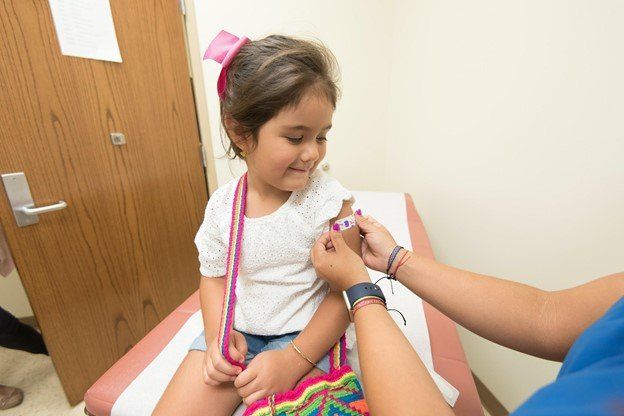How to Prepare For Flu Season [2021] | Rocky Vista Health Center

Our days are getting shorter and the air is getting colder, so we begin preparing for winter with scarves and mittens. We tend to associate fall and winter with Halloween candy, Thanksgiving football, and Christmas, but winter is also known for something less cheerful—the flu.
In this article, we have compiled some important information to help you and your family plan for your vaccination appointment this flu season.
Flu Vaccine Information
What is a flu vaccine?
Vaccines that prevent influenza (flu) (often called “flu shots”) protect against the four influenza viruses that research indicates will be most prevalent during the upcoming flu season. Flu vaccines are typically given as shots with a needle, usually injected into an arm. However, nasal spray flu vaccines are also available.
How often should I get the flu shot?
With few exceptions, everyone 6 months or older should get the flu shot every year. While the flu shot is not available throughout the year, once it is available, it is advised that you and your family receive it as soon as possible to ensure you can build up immunity and lower your risk of severe illness.
Flu vaccinations are particularly crucial for people at higher risk of developing serious flu complications. For a comprehensive list of age and health factors that increase the risk of flu-related complications, see Flu-Related Complications and People at Higher Risk on the CDC’s website.
What viruses will the 2021–2022 flu vaccine protect against?
The flu virus has many different strains, and they are always evolving. Flu vaccines in the United States are reviewed annually and updated as necessary to match circulating flu viruses. All flu vaccines this season will be designed to protect against the four most common viruses, according to research.
The US flu vaccine composition is determined every year by the Vaccines and Related Biological Products Advisory Committee (VRBPAC) of the Food and Drug Administration.
What do I do if my provider does not have the vaccine type I want?
CDC recommends the use of any licensed, age-appropriate flu vaccine during the 2021-2022 flu season, including inactivated flu vaccine, high-dose flu vaccine, adjuvanted flu vaccine, recombinant flu vaccine, and nasal spray flu vaccine. Vaccination with a particular vaccine product should not be delayed if another age-appropriate vaccine is available.
I do not have a primary care provider. Where can I get my flu vaccine?
There are various places where you can find flu vaccines if you don't see a regular health care provider. You can usually find them at pharmacies and health departments.
When is the best time to get my flu vaccine?
The best time to get vaccinated is usually in October to November. Everyone should get a flu shot in that time frame. People older than 65 years of age should not get vaccinated too early. Their protection may decrease over time if they start in July or August. The vaccine can however be given to children as soon as it becomes available, even if it is in July or August.
For some children, two doses are required. If your child falls into this category, you should get the first dose as soon as the vaccine is available, because the second shot should be given at least 4 weeks after the first. It is also recommended for women who are in their third trimester of pregnancy to consider early vaccination since this can help protect their infants during the first months of life (when they are too young to receive a vaccination).
How long does the flu vaccine last?
The flu shot protects against the flu for about six months, which is the typical duration of the flu season. Getting a flu shot every year is important, and the best time is before the end of October.
What are the benefits of getting the flu vaccine?
One of the main benefits of getting the flu vaccine is it reduces the likelihood of getting the flu. This illness can lead to severe complications, such as pneumonia.
Getting vaccinated offers society many health benefits, including:
● Preventing millions of flu-related doctor’s visits each year
● Lessening the severity of the illness
● Lowering the number of sick days at work or school
● Reducing flu-related hospitalizations
● Producing greater immunity in your local community
● Reducing flu-related deaths
What are common side effects that could occur?
Side effects of a flu shot may include soreness, redness, swelling at the injection site, headaches (low-grade), nausea, muscle aches, and fatigue. The flu shot, like other injections, can also sometimes cause fainting.
What You Need to Know About Flu Activity
When will flu season start, and when will it peak?
It is difficult to predict when flu season will begin, as it can vary in different parts of the country and from season to season. A possible early and severe flu season could result from reduced population immunity due to the lack of flu virus activity since March 2020, making it even more imperative to get your flu vaccine.
Not many people I know have gotten the flu. Should I wait to get the flu vaccine?
Certainly not. It is in your best interest to get vaccinated before flu activity is high in your neighborhood. Vaccination is generally recommended in September and October, and everyone should be vaccinated by the end of October.
Flu activity in your community may be low right now, but it could increase at any time. After you receive a flu shot, your body takes about two weeks to develop antibodies that protect you from the flu. To reduce your risk of the flu, get vaccinated by the end of October.
Flu Season Information and COVID-19
What’s the difference between the flu and COVID-19?
COVID-19 and the flu are both contagious respiratory illnesses, but they are caused by different viruses. COVID-19 is caused by infection with a coronavirus (called SARS-CoV-2) and seasonal flu is caused by infection with one of many influenza viruses that circulate annually.
Since flu and COVID-19 share some symptoms, people may need to be tested to determine which virus is causing their illness. It is possible to catch both the flu virus and the virus that causes COVID-19 at the same time. In general, COVID-19 seems to spread more easily and cause more serious illnesses than the flu. In contrast to people with flu infections, people with COVID-19 can take more time to show symptoms, and be contagious for a longer period.
Check out this FAQ page from the CDC to see how COVID-19 and flu compare, given the best available information to date.
Can I get the flu and COVID-19 at the same time?
In short, yes. Influenza and other respiratory illnesses like COVID-19 can occur at the same time.
The prevalence of this condition is still being studied by health experts. Flu symptoms and COVID-19 symptoms are quite similar, making it difficult to distinguish between them based solely on symptoms. Diagnostics can help determine if you have influenza or COVID-19.
Does the flu vaccine make me more susceptible to getting COVID-19?
Not at all. You are not at greater risk of infection by COVID-19 or any other Coronavirus after having the flu vaccine. Common human coronaviruses usually cause mild to moderate upper-respiratory tract infections, like the common cold.
Getting a Flu Vaccine During the COVID-19 Pandemic
Can I get my flu vaccine and COVID-19 vaccine at the same time?
Yes, you can get a COVID-19 vaccine or booster and a flu shot at the same time. The evidence suggests that COVID-19 vaccines can be given in combination with other vaccines, such as flu vaccines, and that the system the body uses to develop protection and side effects are similar whether vaccines are administered alone or in combination.
Though both vaccines can be administered at the same time, people should follow the recommended schedule for either vaccine: If you haven't gotten your COVID-19 vaccine, get that vaccine as soon as you can, and ideally get a flu vaccine by October 30.
Do I need the flu vaccine if I wear a mask and practice social distancing?
Yes. You can protect yourself and others from respiratory viruses, such as flu and the COVID-19 virus, by wearing a mask and distancing yourself from others. Flu vaccination, however, is the best way to reduce the risk of getting sick with flu and its potentially serious complications. By getting vaccinated, you may also protect people around you from serious flu complications.
Visit Rocky Vista Health Center Today to Get Your Flu Shot
At Rocky Vista Health Center, we are primary care physicians in Parker, CO, who are proud to offer a variety of services. When you need a medical facility that takes into account your entire well-being, our physicians are here to ensure your adult health care in Parker, CO, is covered. Contact us or drop in to receive your flu shot today.
Keep Your Friend's Informed






